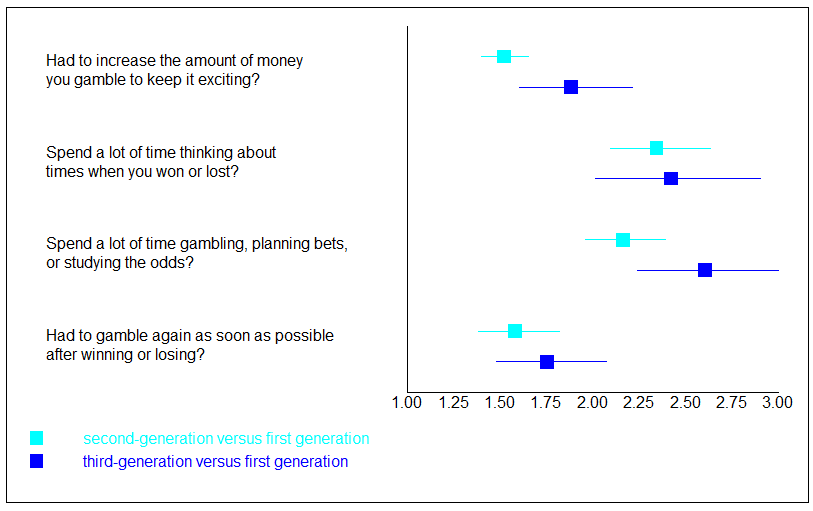Adapting to a new culture can be tough on first-generation immigrants. It can take generations for immigrant families to adapt fully to a new culture[1]. As immigrant families adapt, first-generation immigrants, their second-generation grandchildren, and their third-generation grandchildren can have vastly different experiences. Researcher Alyssa N. Wilson and her colleagues recently examined inter-generational differences in gambling. This week, The WAGER reviews their study[2].
What was the research question?
Are second- and third-generation immigrants more likely or less likely to show signs of gambling-related problems than first-generation immigrants?
What did the researchers do?
The researchers analyzed data from the National Epidemiologic Survey of Alcohol and Related Conditions (NESARC). Wilson and her colleagues used logistic regression to study whether different generations (i.e., first-, second, and third-generation) were more or less likely to report problem gambling behaviors. These analyses took into account factors like age, gender, household income, and other demographics.
What did they find?
Both second- and third-generation immigrants were more likely than first generation immigrants to report (1) tolerance (i.e., needing to increase the amount of money they gamble to keep it exciting), (2) spending a lot of time thinking about times when they won or lost, (3) spending a lot of time gambling, planning bets, or studying the odds, and (4) needing to gamble again as soon as possible after winning or losing. The Figure illustrates these findings.

Figure. Risk ratios and confidence intervals for problem gambling behavior among second- and third-generation immigrants in comparison to first-generation immigrants. Click image to enlarge.
Why do these findings matter?
Immigrant community groups should raise awareness and teach their members about gambling-related problems. That way, if gambling does become an issue with an immigrant’s child or grandchild, they might recognize the problems and act before it creates serious problems.
Every study has limitations. What about this one?
One limitation is that the study didn’t take immigrant family culture into account, even though gambling is more common or acceptable in some cultures than others. When looking at these four signs of gambling related problems, the researchers also did not consider “1.5-generation immigrants.” These are people who came to the U.S. very young (for example, five years old), and spent significant time growing up in American culture and attending American schools. Technically, they’d be classified as first-generation, but they might have more in common with second-generation immigrants.
For more information:
Most states have a toll-free number people can call if they feel that they have problems with gambling. People can also find more information at the National Center for Responsible Gambling’s website.
— Matthew Tom
What do you think? Please use the comment link below to provide feedback on this article.
________________
[1] Here are some example studies.
Christmas, C. N., & Barker, G. G. (2014). The Immigrant Experience: Differences in Acculturation, Intercultural Sensitivity, and Cognitive Flexibility between the First and Second Generation of Latino Immigrants. Journal of International and Intercultural Communication, 7(3), 238–257. http://doi.org/10.1080/17513057.2014.929202
Goforth, A. N., Pham, A. V., & Oka, E. R. (2015). Parent-Child Conflict, Acculturation Gap, Acculturative Stress, and Behavior Problems in Arab American Adolescents. Journal of Cross-Cultural Psychology, 46(6), 821–836. http://doi.org/10.1177/0022022115585140
[2] Wilson, A. N., Salas-Wright, C. P., Vaughn, M. G., & Maynard, B. R. (2015). Gambling prevalence rates among immigrants: A multigenerational examination. Addictive Behaviors, 42, 79–85. http://doi.org/10.1016/j.addbeh.2014.11.003




